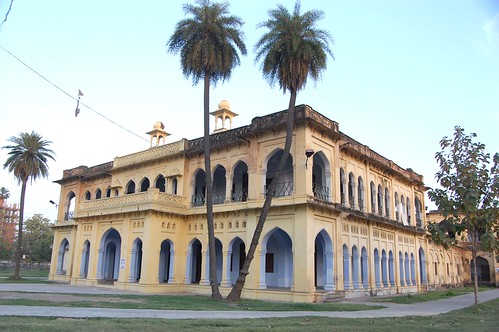
Source: Google Images
Dr. Mazhar Naqvi
Imami
madarsas have played a very crucial role in keeping the Hussaini Mission alive
across the globe. These madarsas have not only produced renowned orators
(zakirs) and scholars but also encouraged extensive research on various aspects
of Karbala revolution to silence those who frequently try to air anti-Ahle-bait
tendencies on flimsy grounds. The establishment of these madarsas paved way for
religious and intellectual networks that strived to revive the real Islam at a
time when British were bent upon shattering Muslim brotherhood in colonial
India. The credit for starting the first such madarsas goes to king Amjad Ali
Shah. It was known as Madarsa Shahi but could not survive for long.
It
was followed by establishment of Imania Arabic College in Varanasi (India). It was established as an Imami Religious Seminary for extending Islamic studies and higher religious
education on 15 December
1866 AD. Founded by Maulvi Khursheed
Ali Khan, on the proposal
of Qazi Maulana Syed Bande
Ali Khan, the last Islamic Chief justice of Varanasi. He provided land for this
purpose and the construction was completed under his supervision in 1870 AD. .
It is an educational, non-profit, charitable institution serving the community continuously for over a century and a half. It
has produced a large number of religious
scholars, preachers, professors, authors, orators (Zakirs/K), poets (S)
and religious activists. The intuition has to its credit the publication of rare books such as
Haqnuma (A booklet published officially by Jamia-e-Imania on Platinum Jubilee
of Mehfil-E-Husaini in 2009), Wasiyatnama written by the founder Late Maulvi
Khursheed Ali Khan, Waqfnama written by Muradan Bibi, Khursheed-e-Khawar by Maulana Syed Saeed Akhtar Rizvi,
Matla-E-Anwar authored by Maulana Syed
Murtaza Husain Sadrul-Afazil.
Sultan-Ul-Madaris
is another madarsa that has greatly contributed to propagation of Imam
Hussain’s message. Established in 1892 by Ayatollah Syed Muhammad Abul Hasan,
madarsa was erected under the supervision of philanthropist of Nawab Mehdi
Hasan Khan. Sultan-Ul- Madaris is the second Imami religious school of Lucknow.
The first one was Madrasatul Imamia with Jamia Nazmia being the third. This
institution has the distinction of producing religious luminaries like Maulana
Syed Mohammad Shakir Naqvi Amrohvi, Maulana Syed Ibne Haider, Maulana Mahmud
Ahmad, Maulana Mohd Mujtaba Husain, Maulana Syed Shahenshah Husain, Maulana
Syed Mohammadd Ghafir Baqarai, Maulana Murtuza Parvi, and Maulana Syed Mohammad
Afzaal Naqvi. The contribution of these cholars to Imami faoith and its
popularity by and large remains matchless.
Madrasatul
Waizeen (College of Preachers) is another
centre of Islamic education of Lucknow. Erected in memory Sahibzada Mohammad Ali Ahmad Khan
Sahib, brother of Maharaja Mohammad Ali Mohammad Khan
of Mahmudabad through a Wakf(
registered) in 1919,madarsa flourished under the leadership of Shams-Ul-Ulema
Ayatollah
Syed Najmul Hasan. In
The Muslim Review: An English Monthly Magazine Of Madrasatul Waizeen,
volume XI, number 3 (September 1932 describes his contribution as:
"Under
the patronage of Shams-Ul-Ulema Ayatollah Syed
Najmul Hasan Sahib,
Mujtahid, this Islamic missionary movement has been working since 1920. Its
field of operations has not been confined to India and Burma but its
missionaries have done a good deal of work in Zanzibar, Uganda, Mombasa,
Darussalam, Singapore, Shanghai”
Madrasatul Waizeen had started sending
missionaries to Africa. They were specially trained for preaching and
propagating Imami faith. They toured and prepared a ground for promoting Azadari
expeditiously in East Africa and extended their activities as far south as Madagascar, and Somalia.
Tanzeem-Ul- Makatib
also deserves a mention in this context. Strictly speaking it is not madarsa
like Nazmia or Sultanul Madaris but its contribution to Imami faith is
tremendous. It is basically an
organization devoted to religious awareness among Imamis of India. Based in
Lucknow, Tanzeem runs hundreds of educational units in a number of Indian
provinces. The organization also runs higher religious education centers,
namely Jamia Imamia for boys and Jamet-uz Zahra for girls. These centers follow
Hauza Syllabus. Tanzeem also conducts educational conferences that serve as
short-term training camps for those desirous of attaining perfection in Imami
faith. (Reference available on request)
No comments:
Post a Comment